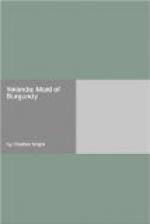“What did you say during the brief interview?” I asked.
“Not one word,” he replied.
“By my soul, you are an ardent lover,” I exclaimed.
“I think she understood me,” Max replied, confidently; and doubtless he was right.
Once more the riddle was solved. A few more solutions and there would be a mad Styrian in Burgundy. My reflections were after this fashion: Princesses, after all, do wander by the moat side and loiter by the bridge. Princesses do go on long journeys with no lady-in-waiting to do their bidding and no servants ready at their call. Yolanda was Mary of Burgundy, thought I, and Max had been throwing away God-given opportunities. Had she not seen Max from the battlements, and had she not fled at sight of the duke? These two small facts were but scant evidence of Yolanda’s royalty, but they seemed sufficient.
“What would you have me say, Karl?” asked Max. “You would not have me speak more than I have already said and win her love beyond her power to withdraw it. That I sometimes believe I might do, but if my regard for her is true, I should not wish to bring unhappiness to her for the sake of satisfying my selfish vanity. If I am not mistaken, a woman would suffer more than a man from such a misfortune.”
Here, truly, was a generous love. It asked only the privilege of giving, and would take nothing in return because it could not give all. If Yolanda were Mary of Burgundy, Max might one day have a reward worthy of his virtue. Yolanda’s sweetness and beauty and Mary’s rich domain would surely be commensurate with the noblest virtue. I was not willing that Max should cease wooing Yolanda—if I might give that word to his conduct—until I should know certainly that she was not the princess. This, I admit, was cruel indifference to Yolanda’s peace of mind or pain of heart, if Max should win her love and desert her.
Because of a faint though dazzling ray of hope, I encouraged Max after this to visit the bridge over the moat, dangerous though it was; and each night I received an account of his doings. Usually the account was brief and pointless. He went, he stood upon the bridge, he saw the House under the Wall, he returned to the inn. But a night came when he had stirring adventures to relate.
At the time of which I am writing every court in Europe had its cluster of genteel vagabonds,—foreigners,—who stood in high favor. These hangers-on, though perhaps of the noblest blood in their own lands, were usually exiles from their native country. Some had been banished for crimes; others had wandered from their homes, prompted by the love of roaming so often linked with unstable principles and reckless dispositions. Burgundy under Charles the Rash was a paradise for these gentry. The duke, who was so parsimonious with the great and wise Philip de Comines that he drove him to the court of Louis XI, was open-handed with these floating villains.




